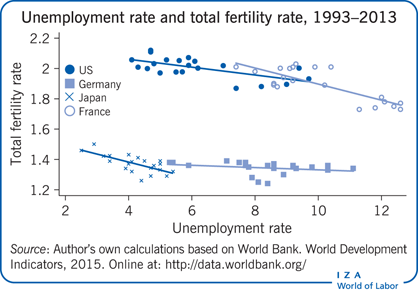Elevator pitch
Low fertility rates are a cause of social concern in many developed countries, with growing youth unemployment often being considered a primary cause. However, economic theory is not conclusive about whether deterioration in youth employment prospects actually discourages family formation or for how long the effect might persist. In addition, recessions can affect the divorce rate. Therefore, understanding the relationship between labor market conditions and family formation can provide important insights into the type of policies that would be most effective in promoting fertility.

Key findings
Pros
Recessions have an effect on family formation, but it is important to distinguish the short-term effects on contemporaneous marriage and fertility rates, and the long-term effects for cohorts exposed to a recession in youth.
Fertility tends to be pro-cyclical in many developed countries, at least in the short term, thus decreasing during economic downturns.
Younger women’s fertility and the number of first births are more responsive to labor market conditions than the fertility of older women and the number of second, or higher-order, births.
Better labor market conditions for young men increase marriages and number of children in the long term.
Cons
It is theoretically ambiguous how business cycle conditions affect family formation, because the effects from less income during a recession versus less opportunity costs from raising children can move in different directions.
The sensitivity of the fertility rate to the prevailing business cycle conditions differ across countries and demographic groups.
There is no consensus on the effects of recessions on divorce rates.
The long-term effect of a recession experienced by young women is inconclusive, and depends on family and labor market policies.